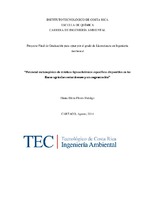Mostrar el registro sencillo del ítem
Potencial metanogénico de residuos lignocelulósicos específicos disponibles en las fincas agrícolas costarricenses para cogeneración
| dc.contributor.author | Flores-Hidalgo, Diana Elena | |
| dc.date.accessioned | 2014-10-30T19:51:55Z | |
| dc.date.available | 2014-10-30T19:51:55Z | |
| dc.date.issued | 2014 | |
| dc.identifier.uri | https://hdl.handle.net/2238/3297 | |
| dc.description | Proyecto de Graduación (Licenciatura en Ingeniería Ambiental) Instituto Tecnológico de Costa Rica, Escuela de Química, 2014. | es_CR |
| dc.description.abstract | In Costa Rica agricultural residues do not have efficient management to exploit them as an energy source, therefore this study evaluates methane yield from elephant grass, banana stem and pineapple and malanga waste leaves for cogeneration. The experiment consisted of four series of batch anaerobic reactors with 6% and 8% of substrate (including co-digestion), incubated for 60 days, 50 days, 35 days. Alkaline treatment (NaOH 6%) and effective microorganisms were used to accelerate the hydrolysis of lignocellulose. The process stability was diagnosed with the study of alkalinity; and the methanogenic yield was analyzed by calculation of Specific Methanogenic Activity (SMA) and modeling Biochemical Methane Potential (BMP) with the Gauss Newton iterative method. The results show that the alkaline buffer capacity of the system is presented in relation HCO3-/CO32- and not only as a result of HCO3-, this is due to the concentration of NaOH; and did not exceed 500 mg CaCO3/L for most of the reactors. This indicates a significant production of volatile fatty acids which confirms the efficiency of alkaline and biological treatment. Methane generation was continuous and without stagnation, this made it difficult for the adjustment of the experimental data with the model of BMP. Methane yield per kg of daily volatile solids (max of 0,0024 Nm3 CH4/kgSV.d with elephant grass) equals to 14 m3 of methane per ton of fresh matter and approximately 36 kWh per month, this can meet the daily electricity demand of four middle class residences in Costa Rica. Finally AME results, more favorable for cogeneration (up to 1980 kWh), are the basis for forecasting increased methane yield by implementing optimal conditions in the digesters. | es_CR |
| dc.language.iso | es | es_CR |
| dc.publisher | Instituto Tecnológico de Costa Rica | es_CR |
| dc.rights | acceso abierto | es |
| dc.subject | Residuos agrícolas | es_CR |
| dc.subject | Fuentes de energía | es_CR |
| dc.subject | Ácidos grasos | es_CR |
| dc.subject | Tratamiento biológico | es_CR |
| dc.title | Potencial metanogénico de residuos lignocelulósicos específicos disponibles en las fincas agrícolas costarricenses para cogeneración | es_CR |
| dc.type | proyecto fin de carrera | es |


